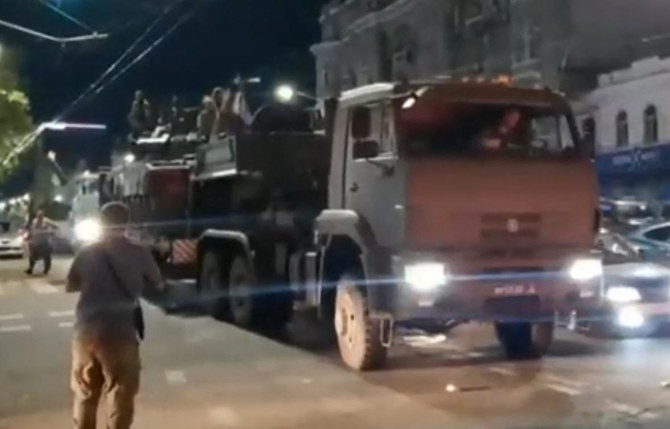MOSCOW: Russian mercenary leader Yevgeny Prigozhin flew into exile in Belarus on Tuesday under a deal that ended a brief mutiny by his fighters, as President Vladimir Putin praised his armed forces for averting a civil war.
A plane linked to Prigozhin was shown on a flight tracking service taking off from the southern Russian city of Rostov early on Tuesday and landing in Belarus.
“I see Prigozhin is already flying in on this plane,” state news agency BELTA quoted Belarusian President Alexander Lukashenko as saying. “Yes, indeed, he is in Belarus today.”
In Moscow, Putin sought to reassert his authority after the mutiny led by Prigozhin in protest against the Russian military’s handling of the conflict in Ukraine.
Russian authorities also dropped a criminal case against his Wagner Group mercenary force, state news agency RIA reported, apparently fulfilling another condition of the deal brokered by Lukashenko late on Saturday that defused the crisis.
Prigozhin, a former Putin ally and ex-convict whose mercenaries have fought the bloodiest battles of the Ukraine war and taken heavy casualties, had earlier said he would go to neighboring Belarus at the invitation of Lukashenko, a close ally of Putin and an acquaintance of the Wagner chief.
Ukraine hopes the chaos caused by the mutiny attempt will undermine Russian defenses as Ukraine presses a counteroffensive to recapture occupied territory in the south and east.
There was little news about progress on the battlefield on Tuesday, but two Russian missiles struck a restaurant in the eastern city of Kramatorsk in the Donetsk region. Andriy Yermak, head of President Volodymyr Zelensky’s administration, said on Telegram that four people were killed and 42 injured, including a child.
The building was reduced to a twisted web of metal beams. “None of the glass, windows or doors are left. All I see is destruction, fear and horror,” Valentyna, 64, said.
Russia has repeatedly denied targeting civilians since launching what it terms a “special military operation” in Ukraine in February 2022.
’YOU HAVE STOPPED CIVIL WAR’
Early on Tuesday, flight tracking service Flightradar24’s website showed an Embraer Legacy 600 jet, bearing identification codes that match a plane linked to Prigozhin in US sanctions documents, descending near the Belarus capital Minsk.
It first appeared on the tracking site above Rostov, the southern Russian city that Prigozhin’s fighters captured during the mutiny.
Prigozhin was seen on Saturday night smiling and high-fiving bystanders as he rode out of Rostov in the back of an SUV after ordering his men to stand down. He has not yet been seen in public in Belarus.
Putin meanwhile told some 2,500 Russian security personnel at a ceremony on a square in the Kremlin complex in Moscow that the people and the armed forces stood together in opposition to the rebel mercenaries.
“You have saved our motherland from upheaval. In fact, you have stopped a civil war,” he said.
Putin was joined by Defense Minister Sergei Shoigu, whose dismissal had been one of the mutineers’ main demands.
Kremlin spokesman Dmitry Peskov told a news briefing on Tuesday the deal ending the mutiny was being implemented.
Russian leaders have tried to convey that the situation is returning to normal. Peskov dismissed the idea that Putin’s grip on power had been shaken by the mutiny, calling such thoughts “hysteria.”
DEMONSTRATION OF PROTEST
Prigozhin, 62, said he launched the mutiny to save his group after being ordered to place it under command of the defense ministry, which he has cast as ineffectual in the war in Ukraine.
His fighters halted their campaign on Saturday to avert bloodshed after nearly reaching Moscow, he said. “We went as a demonstration of protest, not to overthrow the government of the country,” Prigozhin said in an audio message on Monday.
Lukashenko said on Tuesday that his country offered Wagner fighters an abandoned military base. “Please — we have a fence, we have everything — put up your tents,” Lukashenko said, according to BELTA.
The prospect of Wagner establishing a base in Belarus was greeted with alarm by some of its neighbors. Latvia and Lithuania called for NATO to strengthen its eastern borders in response, and Polish President Andrzej Duda described the move a “negative signal.”
Lithuania’s President Gitanas Nauseda said deployment of Wagner fighters in Belarus would destabilize neighboring countries.
NATO Secretary General Jens Stoltenberg told reporters after a meeting with leaders of seven NATO countries in the Hague that the alliance “sent a clear message to Moscow and Minsk that NATO is there to protect every ally, every inch of NATO territory.”
Washington, which has given Ukraine more than $10 billion in military assistance, announced $500 million in new aid including vehicles and munitions, according to a Pentagon statement.















